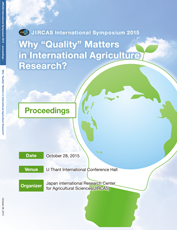Responding to consumers' preference in African rice markets : Experiences of Africa Rice Center

1. Background
The AfricaRice Center (AfricaRice) is a pan-African intergovernmental research association of 25 member
countries. It is also one of the 15 international Centers that are members of the CGIAR Consortium. Through
research for development with partnership, AfricaRice attempts to increase the quantity and quality of rice
grown on the continent to meet the needs of African consumers through reduction of yield gaps and postharvest
losses, and ensuring better quality end-products. These actions should improve access to markets,
incomes of value chain actors, and ensure food and nutrition security. To reach its objective, the Center has
adopted strategies for upgrading participatory rice value chains, starting from end-markets to farmers and
including processors using the multi-stakeholder innovation platforms (IPs) of the rice sector development
hubs. This study focuses mainly on end-markets analysis to gather information on what the market requires
in terms of rice produced locally on the continent. In a recent baseline study conducted by AfricaRice
on markets and consumers’ preference, imported brands remain dominant in most African markets.
Consequently, preference for imported rice appears to be common across Africa, especially in urban centers
(for instance, Demont et al., 2012; Naseem et al., 2013; and Fiamohe et al., 2014). Therefore, matching the
quality of imported rice can be an excellent target for the improvement of locally produced rice (Futakuchi et
al., 2013).
2. AfricaRice’s response to consumers’ demand for rice in Africa
AfricaRice, through its policy task force (TF), has developed market analysis tools which are being used
across African countries to analyse and gather information on rice demand. These tools comprise:
? Market surveys to understand consumers’ buying decision process and Identify the popular types of rice sold
in the markets. These surveys provided an overview of the types of local and imported rice, their attributes
and socio-economic information guiding consumers’ purchasing decision;
? Evaluation of the quality of rice sold in markets by consumers in major African urban areas using the
experimental auctions (EA) approach. EA is a mechanism for evaluating products and price discovery with
the elucidation of willingness to pay by consumers for the most preferred products.
Based on the information gathered so far, the following strategies are being used to upgrade the quality of
milled and parboiled rice:
? Development of women-friendly parboiling technologies and management options to increase post-harvest
yields. This has been done through the Africa-wide Processing and Value-Addition TF working in close
collaboration with the Gender and Mechanization TFs. These technologies have been shown to produce
parboiled rice whose quality is similar to that of premium imported rice;
? Support with branding and packaging to the direct actors in IPs to improve the attractiveness and image of
rice produced locally using novel processing facilities;
? Promotion of rice products in Africa through trade fairs, conference and development exhibition events for
the visibility of products;
All available scalable technologies and innovations, including those mentioned in this paper are documented
on the AfricaRice "Rice-ehub”.
3. Relevant AfricaRice products
The research and development products currently being developed comprise:
? Maps of the most preferred rice (local and imported rice) by urban consumers in relation to their attributes
(Figure 1);
? Rice parboiling plants installed in IPs to improve the quality of locally produced rice (Figure 2);
? Value chain actors’ capacity strengthened for market-oriented production (Figure 3);
? Branding and packaging of quality rice produced using the novel processing units (Figure 4);
? Increase in the visibility of African rice through trade fairs, scientific conferences and exhibition events. 4. Conclusions and way forward
Rice varieties grown locally in many African countries have good organoleptic and nutritional attributes
that meet urban consumers’ preference if properly processed and branded. The improved rice processing
plants developed by AfricaRice is playing a significant role in the upgrading of the quality of locally produced
rice (Ndindeng et al. 2015). In addition, investments in post-harvest technologies to address the physical
appearance of rice in terms of sorting, grading, branding and attractive packaging will catalyze the sector and
improve rice value chain actors’ access to the large urban markets that are currently dominated by imported
brands.
For the sustainability of AfricaRice’s interventions in the rice sector development hubs, there is a
strong need to strengthen the Center’s existing partnerships with strategic partners in the rice value chain.
Furthermore, there is the need for stakeholders to build new collaborative partnerships and networks in the
area of post-harvest. This will improve the rice value chain, quality of locally produced rice, as well as impact
in terms of an increase in local rice consumption in Africa and beyond.
To achieve all these, however, partners and resources for scaling-up are needed to further improve on the
technologies and innovations, as well as out-scaling in a sustainable manner across the entire value chain.
Establishment of marketing contracts between processors in the IPs and promoters of supermarkets, food
shops, etc. will be required to increase the sale of locally produced rice in marketing chains. This should lead
to the strategic re-positioning of locally produced rice in competitive urban markets in Africa and beyond.
| Date of issued | |
|---|---|
| Creator |
Rose Fiamohe
Sali Atanga Ndindeng
Gaudiose Mujawamariya Sidi Sanyang Koichi Futakuchi |
| Subject |
Consumers’ preference women-friendly parboiling technologies branding and packaging local rice Africa. |
| Publisher | Japan International Research Center for Agricultural Sciences |
| Available Online | |
| Issue | 2015 |
| spage | 81 |
| epage | 87 |
| Rights | Japan International Research Center for Agricultural Sciences |
| Language | eng |
